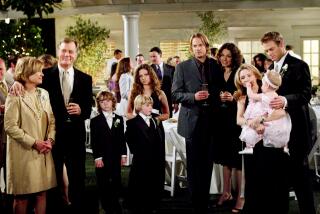Even Those in ‘the Biz’ Point Fingers at TV Sex and Violence
- Share via
Parents who work in the entertainment industry say they are just as upset as the rest of us about sex and violence on television programs. Other people’s programs, that is.
The parents were among those gathered earlier this month in Palo Alto for a conference on media and values sponsored by the advocacy group Children Now. During breaks, we talked about their media and values.
Ted Harbert, president of ABC Entertainment, forbids daughter Emily, 6, to watch practically everything on commercial television. That includes the wildly popular and much maligned “Mighty Morphin Power Rangers,” even though she begged to join the fan club and has put an MMPR poster up on her wall.
“Personally,” Harbert said, “I believe the way that violence is dealt with in that show is not what I want my 6-year-old to see.”
Joel Andryc, senior vice president of development for Saban Entertainment, which produces, among other things, “Mighty Morphin Power Rangers,” said his kids, 7 and 10, watch the Rangers but didn’t see “Jurassic Park.”
“My kids are real sensitive to violence,” he said.
In any case, he’d much rather his kids see the Rangers, which he said teaches teamwork and is racially balanced, than prime-time sitcoms that show and discuss sex. He was concerned about an episode of “Blossom” that dealt with the issue of date rape, an episode of “Step By Step” that talked about virginity, a “Home Improvement” show where Tim Allen’s character and his wife take a shower together. The shows, he said “are pushing kids too quickly to grow up.”
The issues are appropriate for teen-agers, he said. “But Friday night, it’s not teen-agers who are watching the show. It’s kids 6 to 11.”
Like many parents, Andryc has decided to watch TV with his children. He sat on the couch next to his 7-year-old daughter and watched a show about losing virginity, and next to his 10-year-old son and watched a couple getting in the shower, and thought: “Am I going to get up and turn it off and have them think there’s something wrong or unnatural about sex?” and concluded, “No.”
So, he squirmed, let them watch and told himself he’d have a frank discussion with them about the topic. Later. When they’re older--and when he’s ready.
Charles Rosin, executive producer of “Beverly Hills, 90210,” which deals with sex, doesn’t like “The Simpsons.”
“I find with my children (10, 6 and 4), their behavior changes when they watch different shows. They become antisocial. They fight with each other.”
Dick Wolf, president of Wolf Films in Association with Universal Television, said his children (10, 8 and 2) watch one of his shows, “New York Undercover,” but not another, “Law & Order.” What really bothers him is the commercialism on Saturday morning cartoons, which are banned in his house. “I think it’s garbage.”
Winnie Holzman, creator of the realistic high school drama “My So-Called Life,” said she doesn’t want her 9-year-old daughter watching the news.
“I don’t like her to be exposed to any of that awful stuff, or that show ‘Hard Copy.’ Or I would never want her to watch those awful afternoon talk shows,” Holzman said.
A news correspondent, who asked to remain nameless, said whatever control parents have over young children can vanish when they become mobile, independent teen-agers.
“You’re helpless,” said the correspondent, whose 12-year-old was caught ordering pornographic movies over pay TV.
In the midst of the conference, President Clinton appeared in a taped message to tell participants, “Like it or not, media is an important influence on our young people. It is the creative decisions of those of you in the entertainment industry that determine which movies will be made, what shows are aired, what characters the new generation of children will come to love and emulate.
“No one will take away that freedom of expression from you. But we do ask you and we should ask you to exercise responsibility and good judgment, to weigh your powers of influence carefully as you make important decisions, to weigh what may be commercially successful in the short run with what may be important to our public lives and our private successes over the long run. . . .”
The speech was unremarkable in the sense that no one remarked on it, except for one speaker who puzzled over what Clinton meant.
It’s hard to see how anyone will understand until they realize that “they” are really “us.”
More to Read
The complete guide to home viewing
Get Screen Gab for everything about the TV shows and streaming movies everyone’s talking about.
You may occasionally receive promotional content from the Los Angeles Times.






